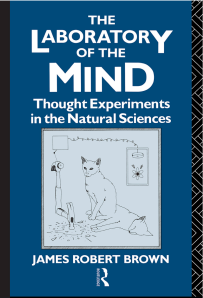Having gone through the book Robert Browns Laboratory of Mind – Thought Experiments in Natural
Sciences, I have taken the following notes. Though the book starts with examples from a varied disciplines it culminates trying to interpret the EPR paradox in a way. Though an interesting book to read for a philosopher of science. I would have liked to see some detailed discussions on some of the thought experiments, the book could have been more aptly titled Thought Experiments in [Quantum] Sciences, though there is an entire chapter on Einstein, who is the master of such thought experiments, equaled only by Galileo.
Quotes
As I was sitting in my chair
I knew the bottom wasn’t there,
Nor legs nor back, but I just sat,
Ignoring little things like that.
Logic alone cannot give us great wealth of mathematical results.
since abstract objects if they did exist would be unknowable.
just as no experiment in physics is really crucial, so no argument
in philosophy is really conclusive. 73
In reality the very opposite happens. It is the theory which
decides what we can observe…’ 106
the crucial difference between Einstein and those who make the
correspondence with experimental fact the chief deciding factor
for or against a theory: even though the ‘experimental facts’ at
that time very clearly seemed to favor the theory of his opponents
rather than his own, he finds the ad hoc character of their
theories more significant and objectionable than an apparent
disagreement between his theory and their ‘facts’. 120
As Heisenberg put it, This probability function represents a
mixture of two things, partly a fact and partly our knowledge of a
fact’ (1958, 45). 128
What is even meant by ‘an interpretation of the QM formalism’ is
somewhat vague. Logicians have a precise notion of
‘interpretation’ or ‘model of a formal system’, but that won’t do
here. To start with, the formalism is already partially
interpreted; it is hooked to observational input and output in a
clear and unambiguous way. This partial interpretation is called
the minimal statistical interpretation. What it can do is handle
everything observable. It is often favoured by those who advocate
an instrumentalist outlook for scientific theories in general. But
our interest is with how the world really works, not just with
making successful observable predictions. Only those lacking a
soul are content with the minimal statistical interpretation. 131
In many (perhaps all) scientific theories, there are elements
which are taken as just brute facts. For instance, in Newton’s
physics, inertia is an unexplained explainer; it accounts for
other phenomena, but is itself unaccounted for. Are EPR
correlations like that? 146
* Questions
1. When we see one swan to be white we do not conclude immediately
that all swans are white. But on the other hand we conclude that
all gold atoms have the same atomic number 79. Why is there an
asymmetry between the two modes of thought?
2. Why does 3>2 seems intuitively pretty obvious, whereas `proton is heavier than
electron’ does not?
3. Quine says, our conviction that 2+2=4 does not stem from laboratory
observations, no matter how carefully performed or often
repeated. Comment.
4. How would things be different if there were no abstract objects but
everything else, including our ‘intuitions’, remained the same?
5. Is Newton’s first law only vacuously true? Let me elaborate on
this. The first law as known states the following:
/A body will continue its state motion or rest, unless it is acted
upon by a force./
Now how do we do this experiment in real? Can we have /any/ test
body which is far away from any other body, so that there are /no/
forces acting on the test body? If not, then how can we be assured
about the validity of the first law?
6. Though we often now make fun of theories like phlogiston, caloric
or aether, they were actually successful to some degree in their
day and were believed by reasonable people. (Maxwell once said that
the aether theory was the best confirmed in all science.) The
physical world somehow or other contributed to the production of
these rational, but false, beliefs. How is it that a (physical)
world that contains no phlogiston, caloric, or aether can somehow
be responsible for bringing about the phlogiston, caloric, and
aether theories?


